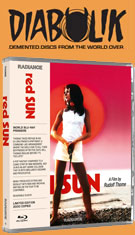
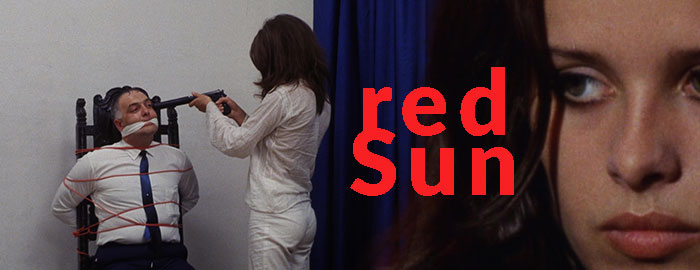
Color, 1970, 89 mins. 6 secs.
Directed by Rudolf Thome
Starring Marquand Bohm, Uschi Obermaier, Gaby Go, Sylvia Keklue, Diana Korner
Radiance Films (Blu-ray) (US/UK R0 HD), Arthaus (DVD) (Germany R2 PAL) / WS (1.66:1) (16:9)
At least on paper, 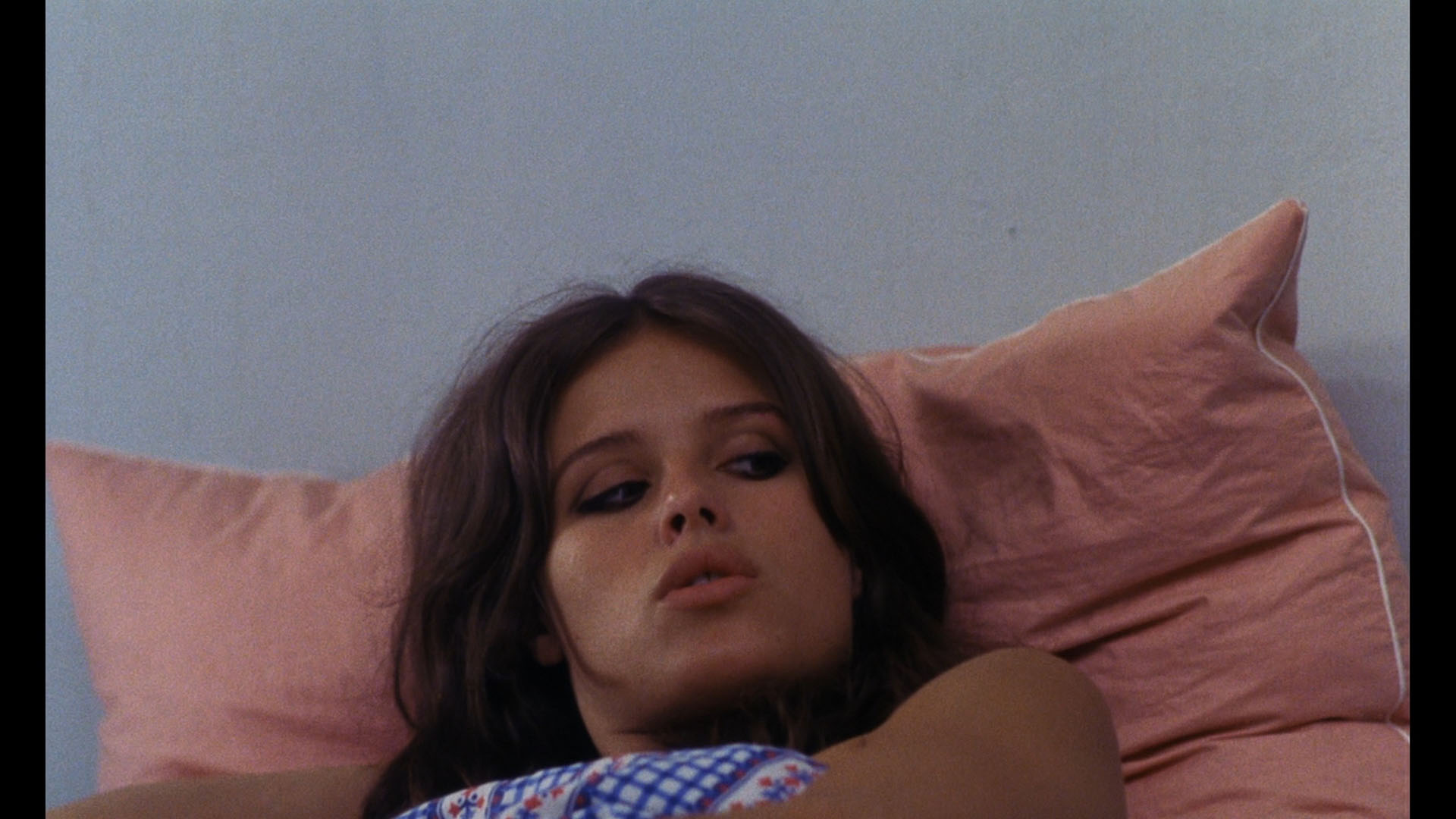 the West German film Red Sun (Rote sonne) sounds like part of the string of captive male / predatory
the West German film Red Sun (Rote sonne) sounds like part of the string of captive male / predatory 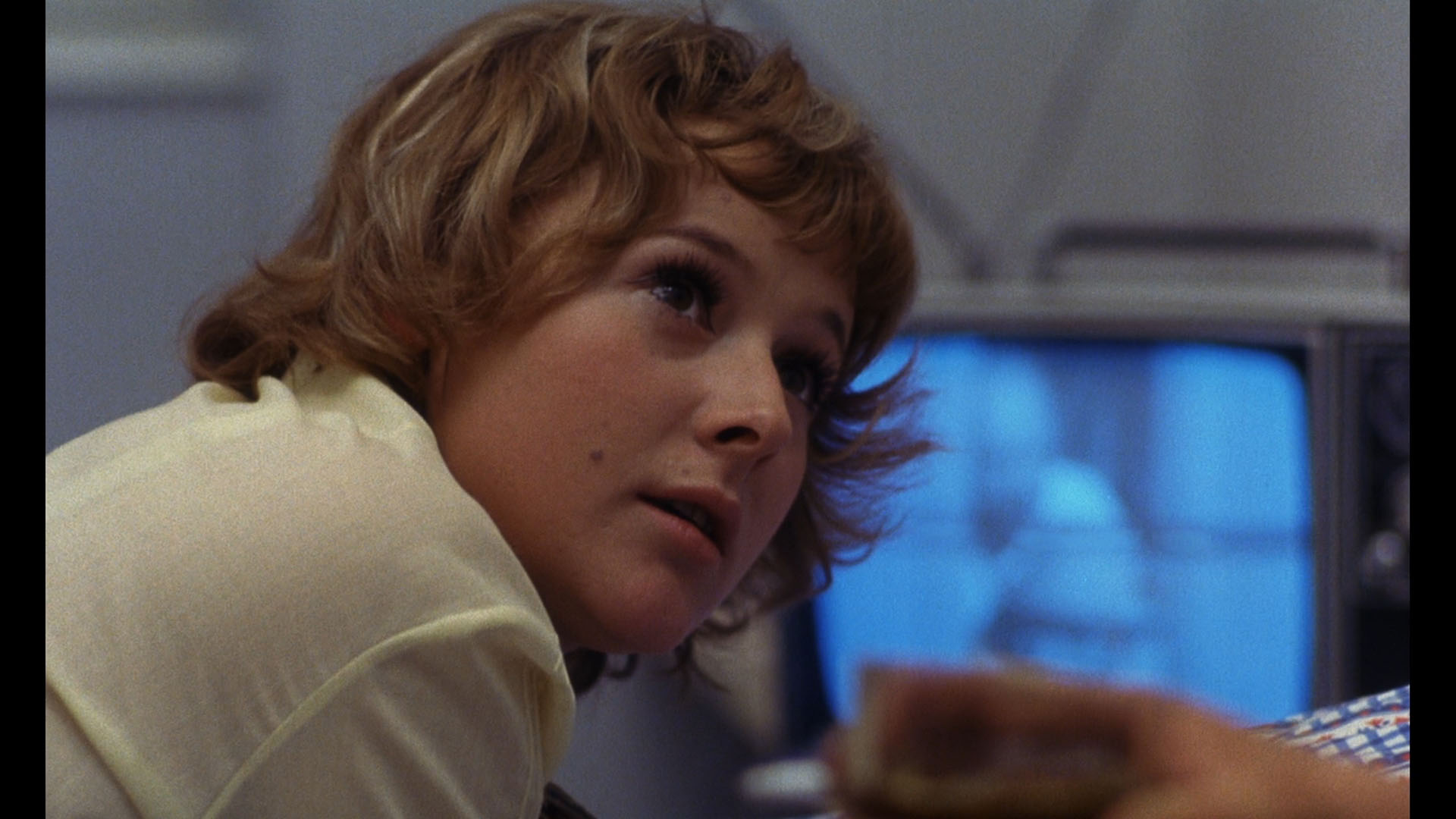 female household movies that proliferated in the early '70s from The Beguiled to Queens of Evil. In execution though it's something a bit different, charting the mission of four women who decide to kill every man they stay with for five days because "they deserve it." Featuring a strong pop art sensibility and an off-kilter sensibility, it's a tough film to classify but a haunting viewing experience if you take it in the right spirit.
female household movies that proliferated in the early '70s from The Beguiled to Queens of Evil. In execution though it's something a bit different, charting the mission of four women who decide to kill every man they stay with for five days because "they deserve it." Featuring a strong pop art sensibility and an off-kilter sensibility, it's a tough film to classify but a haunting viewing experience if you take it in the right spirit.
Hitchhiking his way to Munich, Thomas (Berlin Alexanderplatz's Bohm) reconnects with his ex Peggy (Obermaier), a bartender, and ends up crashing at her commune-style apartment with three roomies (Go, Keklue, and Korner). As it turns out, the ladies have built up an antisocial mini-society where men have to be dispatched after they've been bedded, and anything goes when it comes to criminal activity like kidnapping and extortion. Director Rudolf Thome was a relative newcomer on the scene when he directed this one on the heels of his internationally screened Detektive, and though this didn't set the world on fire, Red Sun did pave the way for a slew of subsequent projects including Closed Circuit and Tarot. Today much of its fascination lies in the 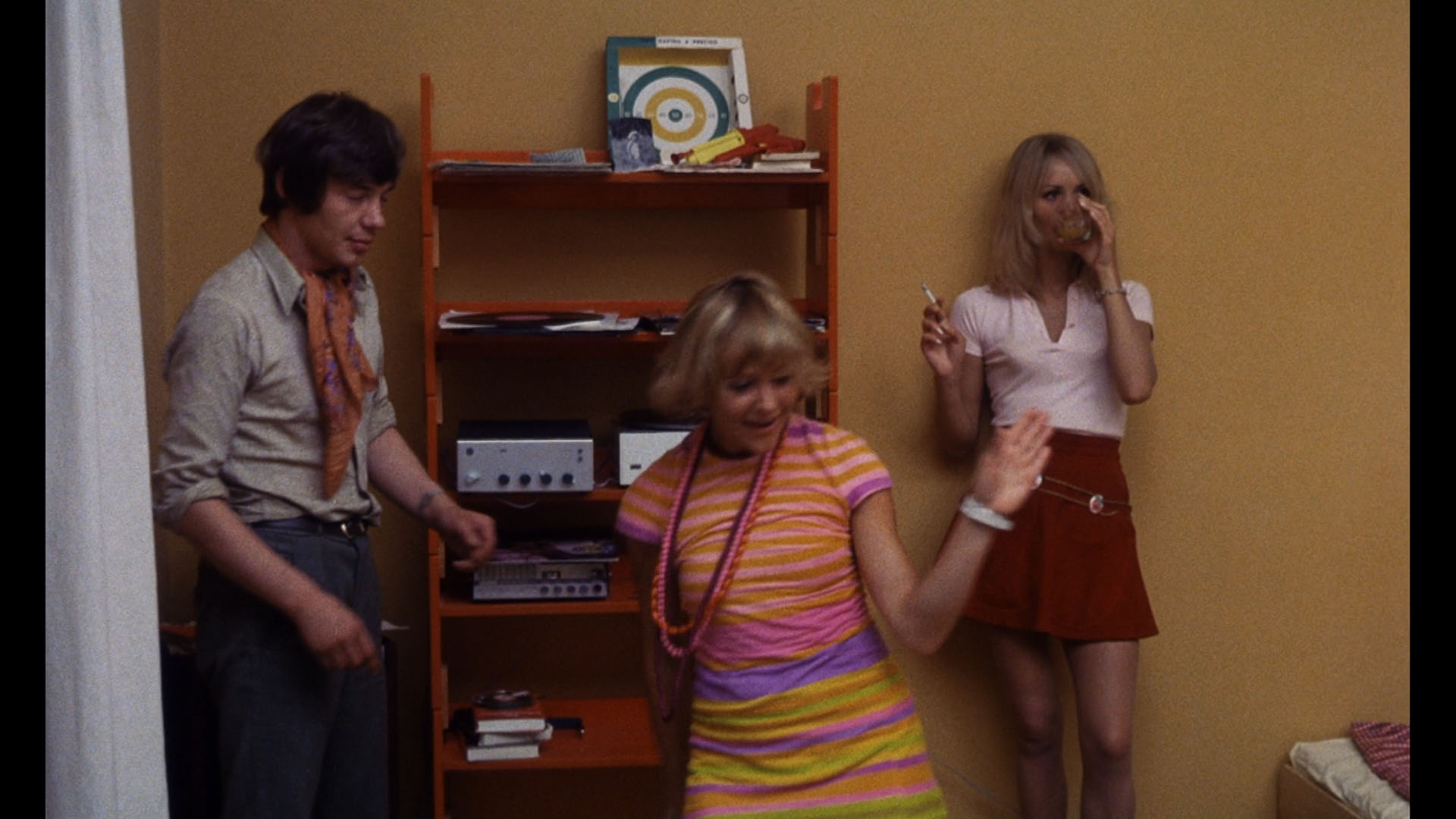 overlapping with the escalating social unrest throughout Europe with Obermaier (who walked the walk in real life as well with a counterculture lifestyle) making the
overlapping with the escalating social unrest throughout Europe with Obermaier (who walked the walk in real life as well with a counterculture lifestyle) making the 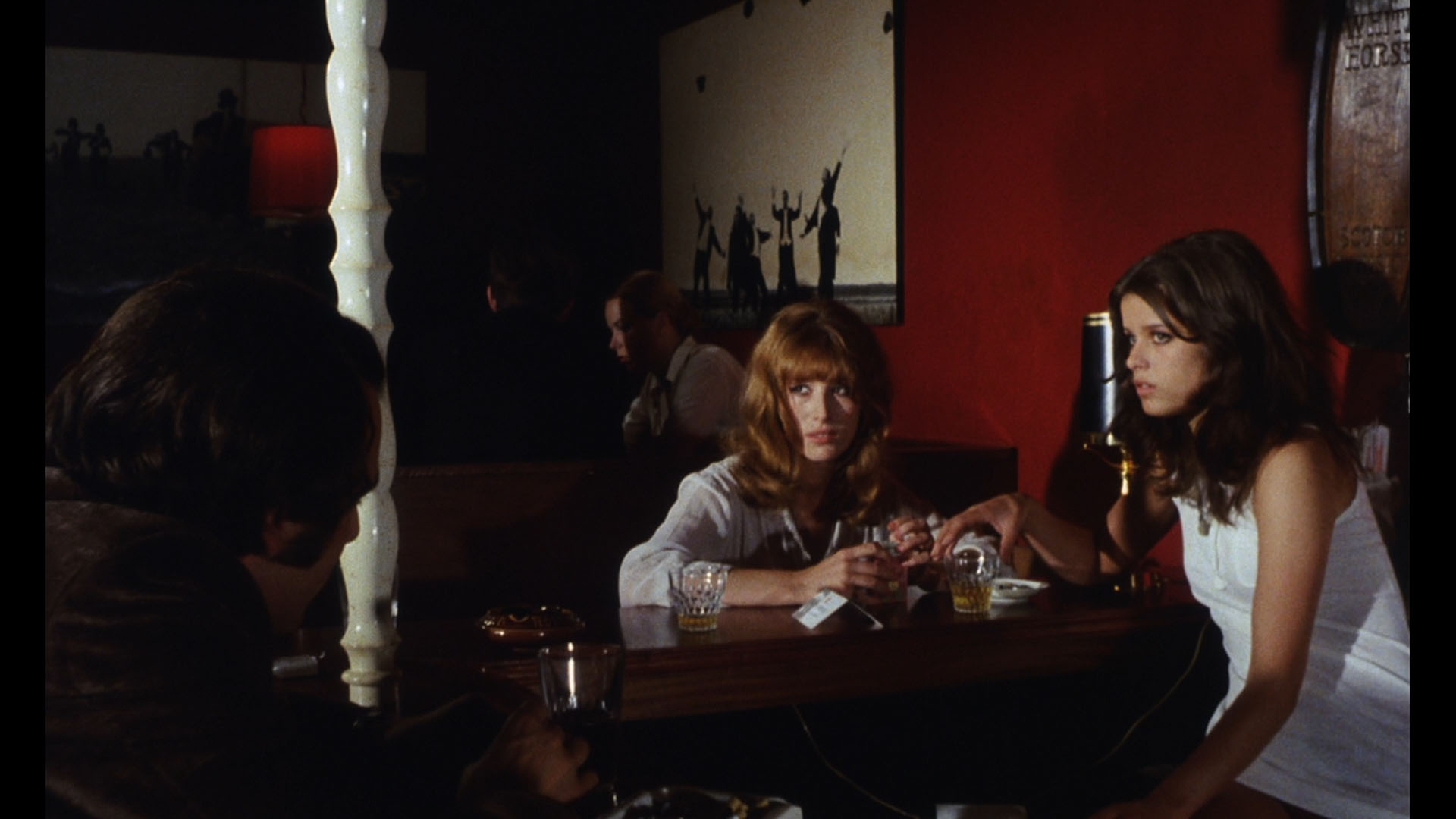 strongest impression here in what should have been more of a breakthrough role.
strongest impression here in what should have been more of a breakthrough role.
Never given an official English-subtitled release of any kind at the time, Red Sun hit German DVD a couple of times but should find a much larger audience with its 2023 Blu-ray release from Radiance Films simultaneously in the U.S. and U.K. (limited to 2,000 copies in each territory). The HD transfer supervised by Thome looks excellent with the frequent vivid primary colors (especially red and gold) making a strong visual impression; the film comes up with a unique look for all of its substantial locations (the apartment, nightclub, and outdoors), and this version shows it off very well. The LPCM 2.0 German mono track is also in fine shape (the classic music fares especially well) and comes with optional English subtitles.
A self-described "free-flowing" select scene commentary features Thome and Rainer Langhans, Obermaier’s boyfriend and fellow Kommune 1 member who was on set for the shoot. More or less the influence for Thomas (albeit hopefully more sympathetic), Langhans seems to be having a lot of fun chatting with the filmmaker; It sounds like they're in a bar or some other echo-y place and can be hard to follow at times, but there's some valuable info here about the complicated process of getting the film cast and made. The track can be played sequentially or in 11 different segments. "Rote Sonne between Pop Sensibility 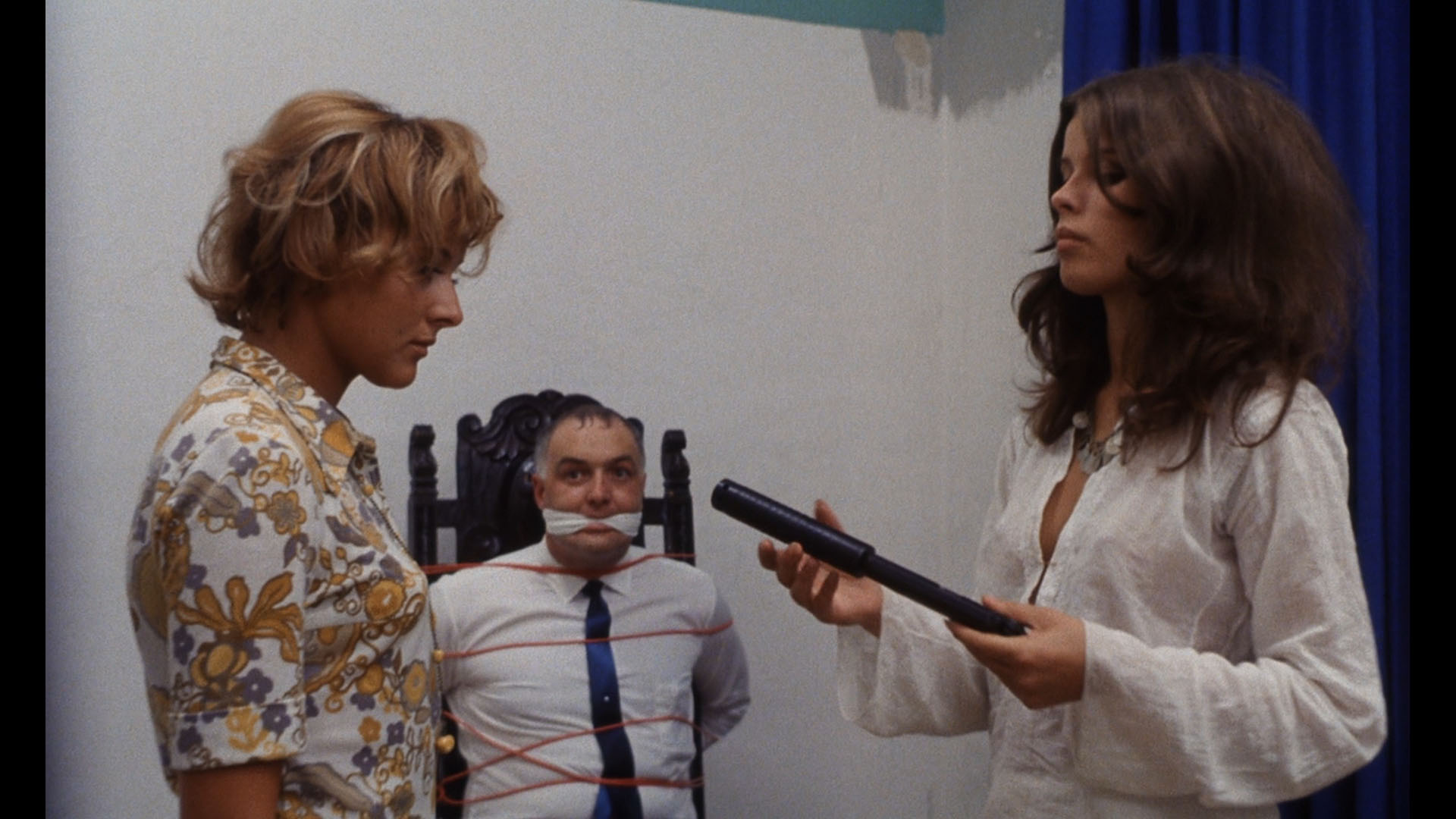 and Social Critique" (20m39s) is a new video essay by scholar Johannes von Moltke about his discovery of the
and Social Critique" (20m39s) is a new video essay by scholar Johannes von Moltke about his discovery of the 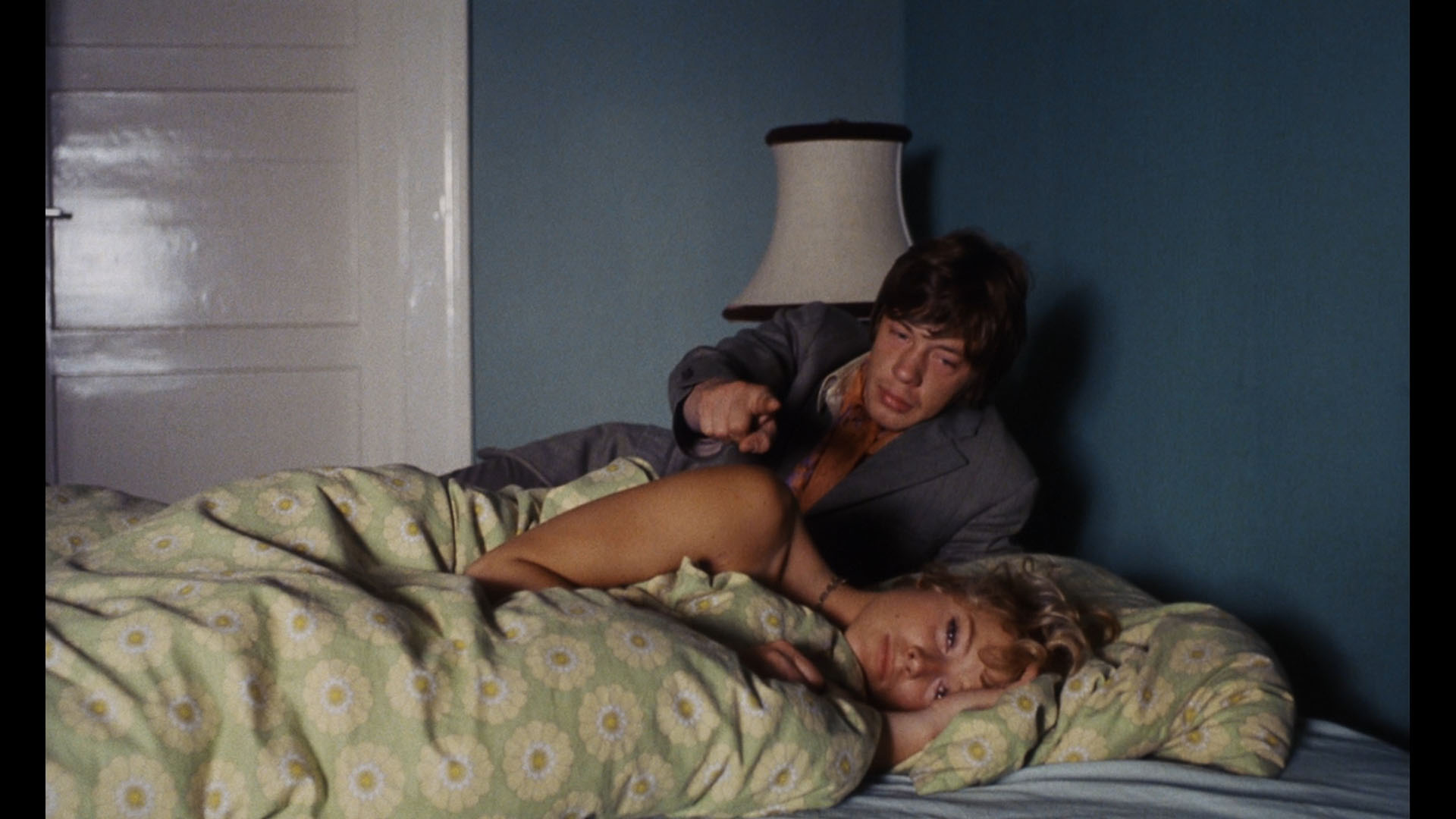 film in the '90s, the film's relevance to modern audiences, and its ties to the New German Cinema that was still in its early days when this was made. In "From Oberhausen to the Fall of the Wall" (49m53s), Margaret Deriaz dives deeper into the New German Cinema angle looking at the advent of the Oberhausen Manifesto that kicked off the wave in the early '60s through the evolution of West German cinema and its global impact until the late '80s as the country itself dealt with its recent horrific past. The package also comes with a 52-page booklet featuring a new essay by Samm Deighan about the film's place in leftist political cinema in Europe around the turn of the decade and other radical treatments of females driven to violence, plus newly translated archival letters by Wim Wenders, an archival Thome interview, assessments from critic Enno Patalas, and the German Film Evaluation Office on the film’s official submission.
film in the '90s, the film's relevance to modern audiences, and its ties to the New German Cinema that was still in its early days when this was made. In "From Oberhausen to the Fall of the Wall" (49m53s), Margaret Deriaz dives deeper into the New German Cinema angle looking at the advent of the Oberhausen Manifesto that kicked off the wave in the early '60s through the evolution of West German cinema and its global impact until the late '80s as the country itself dealt with its recent horrific past. The package also comes with a 52-page booklet featuring a new essay by Samm Deighan about the film's place in leftist political cinema in Europe around the turn of the decade and other radical treatments of females driven to violence, plus newly translated archival letters by Wim Wenders, an archival Thome interview, assessments from critic Enno Patalas, and the German Film Evaluation Office on the film’s official submission.
Reviewed on June 12, 2023.



 the West German film Red Sun (Rote sonne) sounds like part of the string of captive male / predatory
the West German film Red Sun (Rote sonne) sounds like part of the string of captive male / predatory  female household movies that proliferated in the early '70s from The Beguiled to Queens of Evil. In execution though it's something a bit different, charting the mission of four women who decide to kill every man they stay with for five days because "they deserve it." Featuring a strong pop art sensibility and an off-kilter sensibility, it's a tough film to classify but a haunting viewing experience if you take it in the right spirit.
female household movies that proliferated in the early '70s from The Beguiled to Queens of Evil. In execution though it's something a bit different, charting the mission of four women who decide to kill every man they stay with for five days because "they deserve it." Featuring a strong pop art sensibility and an off-kilter sensibility, it's a tough film to classify but a haunting viewing experience if you take it in the right spirit.  overlapping with the escalating social unrest throughout Europe with Obermaier (who walked the walk in real life as well with a counterculture lifestyle) making the
overlapping with the escalating social unrest throughout Europe with Obermaier (who walked the walk in real life as well with a counterculture lifestyle) making the  strongest impression here in what should have been more of a breakthrough role.
strongest impression here in what should have been more of a breakthrough role.  and Social Critique" (20m39s) is a new video essay by scholar Johannes von Moltke about his discovery of the
and Social Critique" (20m39s) is a new video essay by scholar Johannes von Moltke about his discovery of the  film in the '90s, the film's relevance to modern audiences, and its ties to the New German Cinema that was still in its early days when this was made. In "From Oberhausen to the Fall of the Wall" (49m53s), Margaret Deriaz dives deeper into the New German Cinema angle looking at the advent of the Oberhausen Manifesto that kicked off the wave in the early '60s through the evolution of West German cinema and its global impact until the late '80s as the country itself dealt with its recent horrific past. The package also comes with a 52-page booklet featuring a new essay by Samm Deighan about the film's place in leftist political cinema in Europe around the turn of the decade and other radical treatments of females driven to violence, plus newly translated archival letters by Wim Wenders, an archival Thome interview, assessments from critic Enno Patalas, and the German Film Evaluation Office on the film’s official submission.
film in the '90s, the film's relevance to modern audiences, and its ties to the New German Cinema that was still in its early days when this was made. In "From Oberhausen to the Fall of the Wall" (49m53s), Margaret Deriaz dives deeper into the New German Cinema angle looking at the advent of the Oberhausen Manifesto that kicked off the wave in the early '60s through the evolution of West German cinema and its global impact until the late '80s as the country itself dealt with its recent horrific past. The package also comes with a 52-page booklet featuring a new essay by Samm Deighan about the film's place in leftist political cinema in Europe around the turn of the decade and other radical treatments of females driven to violence, plus newly translated archival letters by Wim Wenders, an archival Thome interview, assessments from critic Enno Patalas, and the German Film Evaluation Office on the film’s official submission.![]()